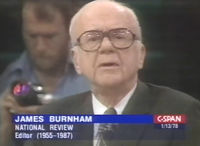National Review
The National Review is an influential political newsmagazine, created by William F. Buckley in 1955 and currently edited by Rich Lowry. Along with the Weekly Standard and the American Spectator, it is regarded as one of the Big Three of conservative magazines. Neither the National Review nor the Weekly Standard have been particularly conservative on social issues.
The National Review is somewhat neoconservative in philosophy, though not as neoconservative as the Weekly Standard. It also is prominent in the Never Trump movement. It has promoted numerous left-wing policies.[1]
Contents
Early history
At the time of the Magazine's founding, National Review met with harsh criticism from progressive activists. Ranging anywhere from "fascist", "nazi", and other common epithets that they've been using for decades, they tried to marginalize the publication to prevent it from ever becoming successful.[2]
Four Horsemen of Progressivism
In 2009, National Review ran a series of four articles attempting to highlight the history of progressivism and how it relates to today.[3][4] They highlighted Richard T. Ely,[5] John Dewey,[6] Oliver Wendell Holmes, Jr.,[7] and Herbert Croly.[8]
Shift to the Left
From its beginning, Buckley and the National Review moved to ostracize any conservative – usually strong, consistent conservatives – that disagreed with their moderate and internationalist version of "conservatism."Cite error: Closing </ref> missing for <ref> tag It was home to many anti-Trump commentators during and after the 2016 presidential election.
See also
External links
References
- ↑ Byas, Steve (January 18, 2019). National Review Continues to be a Trojan Horse Inside the Gates of Conservatism. The New American. Retrieved January 18, 2019.
- ↑ William F. Buckley Jr.: The Maker of a Movement, "Dwight Macdonald in Commentary wrote that the magazine appealed to "the half-educated, half-successful provincials... who responded to Huey Long, Father Coughlin, and Senator McCarthy."
- ↑ The Four Horsemen Of The Progressive Apocalypse
- ↑ Now that’s Progressive!
- ↑ Richard Ely’s Golden Calf
- ↑ John Dewey and the Philosophical Refounding of America
- ↑ The Curious Constitution of Oliver Wendell Holmes Jr.
- ↑ Herbert Croly’s American Bismarcks
